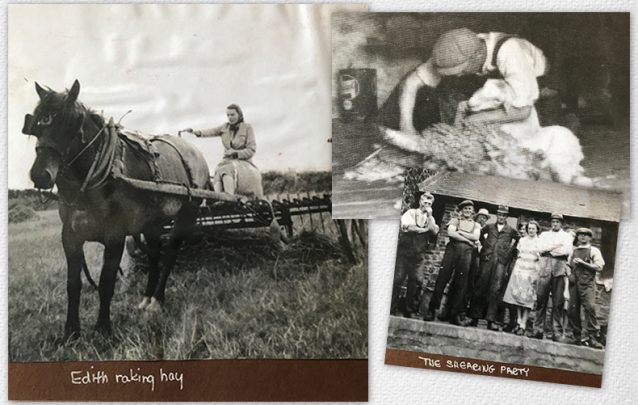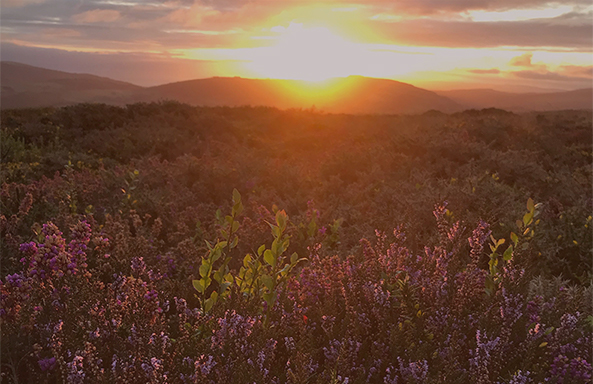Exmoor Horn Wool | Q&A with Dick Tucker, Farmer
14 October 2021
In celebration of our brand new Limited Edition Lana mattress by Vispring, this week, we are in the beautiful hills of Exmoor to visit Dick Tucker on Lucott Farm, where his family has been farming for over 70 years. He’s one of only 120 registered breeders of the native Exmoor Horn, one of Britain’s oldest native breeds.
But what’s it like to be a sheep and cattle farmer in one of the world’s most beautiful locations? We chat about all things Exmoor Horn Wool and the year-round beauty of Exmoor.
The family has been on Exmoor for over 400 years, and I’m the 3rd generation here at Lucott Farm. My grandfather initially rented part of the farm and then successfully purchased it with the ground, and my father added more land in the ’80s. We’ve been here for over 70 years. There was no electricity then, and the farm was in terrible repair.
But what’s it like to be a sheep and cattle farmer in one of the world’s most beautiful locations? We chat about all things Exmoor Horn Wool and the year-round beauty of Exmoor.
1. How long have you and your family been farming?
The family has been on Exmoor for over 400 years, and I’m the 3rd generation here at Lucott Farm. My grandfather initially rented part of the farm and then successfully purchased it with the ground, and my father added more land in the ’80s. We’ve been here for over 70 years. There was no electricity then, and the farm was in terrible repair.
2. What are some of the unique qualities of the Exmoor Horn?
Exmoor horn sheep are incredibly tough, resilient to the wind and rain with coarse, strong wool. They require little extra feed and housing, and they are excellent mothers that milk well but can be highly strong-willed!
It is down to these unique and special qualities that we have launched the brand new Limited Edition Lana mattress, utilising the firm and hardy qualities of Exmoor Horn wool, click here to learn more.
3. Why did you choose to breed this variety of sheep?
For us, they are extremely good at utilising rough, poor pasture land and thriving on it. They last a long time, and they provide us with the fantastic Exmoor mule ewe for breeding when you cross them.
4. What main challenges do you face as an Exmoor Horn breeder?
As many sheep breeders, we are constantly under pressure from many different angles, finding outlets for our lambs, for our breeding stock. Many of these are out of our control, dictated by government legislation and weather factors. We produce the finest wool, and presently it costs us more to shear a sheep than the value of the wool.
5. What do you enjoy most about being a farmer?
I enjoy so much about being a farmer; I’m surrounded by my family in the most special place in the whole wide world, my livestock help create and maintain unique ecosystems containing rare species and wildlife which I see daily and others will never see in their entire lifetime… the sunrises and sunsets can be pretty special also.
6. What is your favourite time of year in your profession?
My favourite time of the year is autumn. Hopefully, the barns are full of winter feed and bedding; we’re selling produce, there usually is grass in the fields and smells wonderful on a cold dewy morning, and the golden colours of leaves and purple heather are stunning. The ewes and lambs are looking at their best. Mind you; it is always lovely to see the daffodils and newborn lambs appear in the spring after a long grey winter.
7. What do you see in the future for British Wool?
I hope that the future for wool is positive; it’s one of the most natural, environmentally sensitive, low carbon products on the planet, but if only it were more recognised across the country. Thanks to companies like Vispring, who are leading the way in utilising it, they are spreading the word globally.
8. What does your partnership with Vispring mean to you and the wider Exmoor Horn breeding community?
The partnership with Vispring means the world to the Exmoor Horn sheep breeders society; we are incredibly proud of our sheep and society heritage, so to have a company like Vispring with such great heritage, quality, and craftsmanship is the perfect partnership for us all, and hopefully can be maintained for years to come. We are incredibly grateful to Vispring.

